Key takeaways
- Local music scenes reflect the culture and history of neighborhoods, offering authentic musical experiences that tell unique stories.
- Building genuine relationships with musicians involves patience, consistent support, and a deep appreciation for their craft.
- Collaboration thrives on openness and respect, allowing for creative exploration and growth through shared experiences.
- Maintaining long-term connections requires consistent engagement and celebration of others’ achievements, fostering a supportive community.
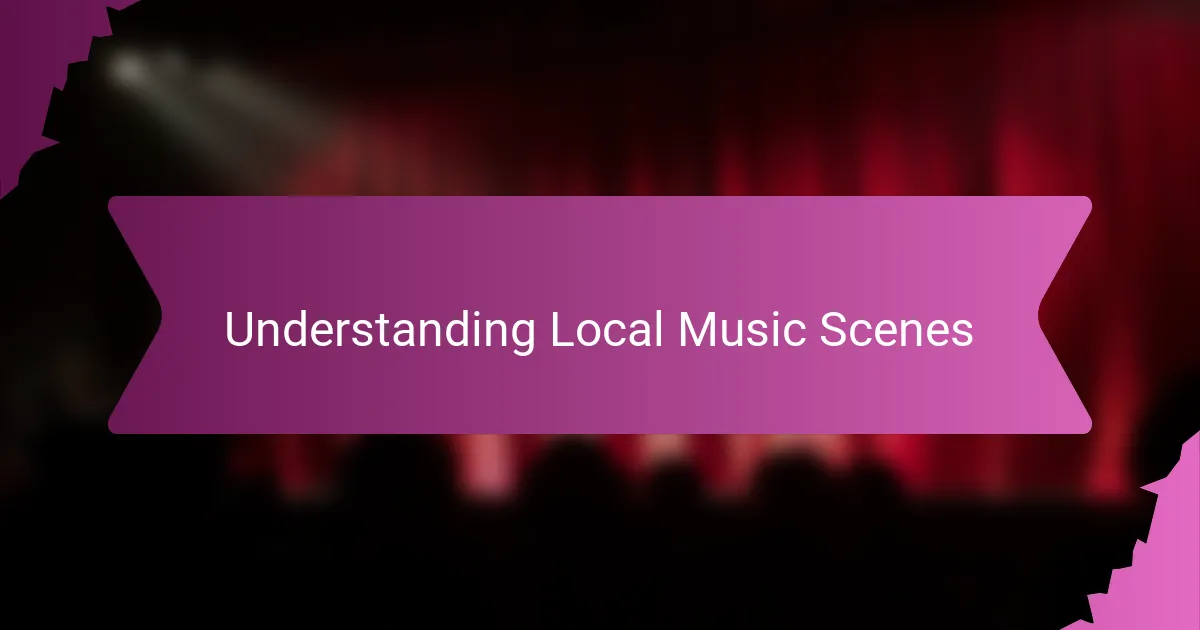
Understanding Local Music Scenes
Local music scenes are like living ecosystems, constantly evolving with the people who breathe life into them. I’ve found that truly understanding the vibe of a neighborhood’s music means immersing myself in the venues, the crowd, and even the way artists interact offstage. Have you ever noticed how a tiny, tucked-away café can hold the most authentic sounds, far richer than a massive concert hall?
What fascinates me is how these scenes reflect the culture and history of their area. When I spend time at local shows, I’m not just listening to music; I’m witnessing stories that neighborhoods tell through rhythms and lyrics. It makes me wonder, how much of a city’s identity do we miss when we skip these grassroots scenes?
For me, diving into local scenes is about patience and curiosity, not just instant discovery. Over time, I’ve learned that the connections you build here often come from shared experiences and genuine appreciation—not just from a love of music, but from understanding the people behind it. Don’t you think that makes these connections all the more meaningful?
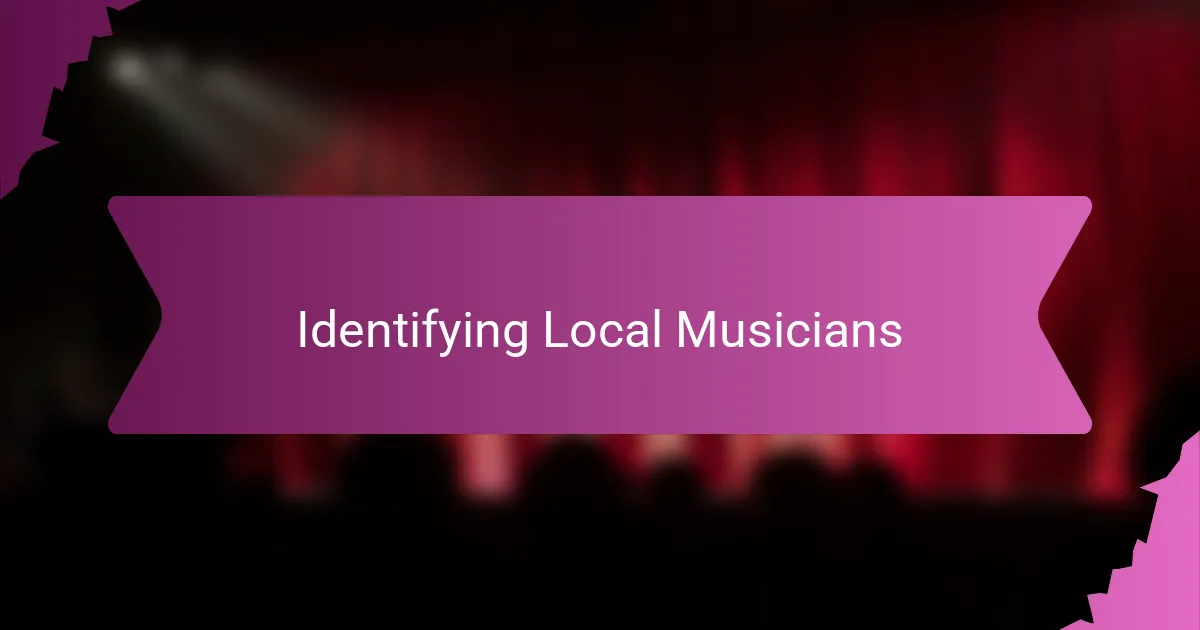
Identifying Local Musicians
Identifying local musicians starts with listening closely—really tuning in to the sounds that aren’t yet mainstream but pulse through the streets. I remember stumbling upon a street corner where a young guitarist played with such raw passion that it instantly made me curious about who they were and where their music came from. Have you ever felt that sudden urge to know an artist’s story just from hearing their first chord?
Another way I find local talent is through word of mouth. Often, it’s conversations with venue staff or fellow music lovers that lead me to discover musicians still flying under the radar. There’s something deeply rewarding about following these personal recommendations—like being let in on a secret that’s just starting to bloom within the community.
Sometimes, I simply pay attention to social media feeds and community bulletin boards where musicians promote their upcoming gigs or collaborations. It’s fascinating how these digital breadcrumbs provide clues about who’s actively shaping the local soundscape. Isn’t it amazing how a few clicks can open the door to meaningful connections with artists right in your own backyard?
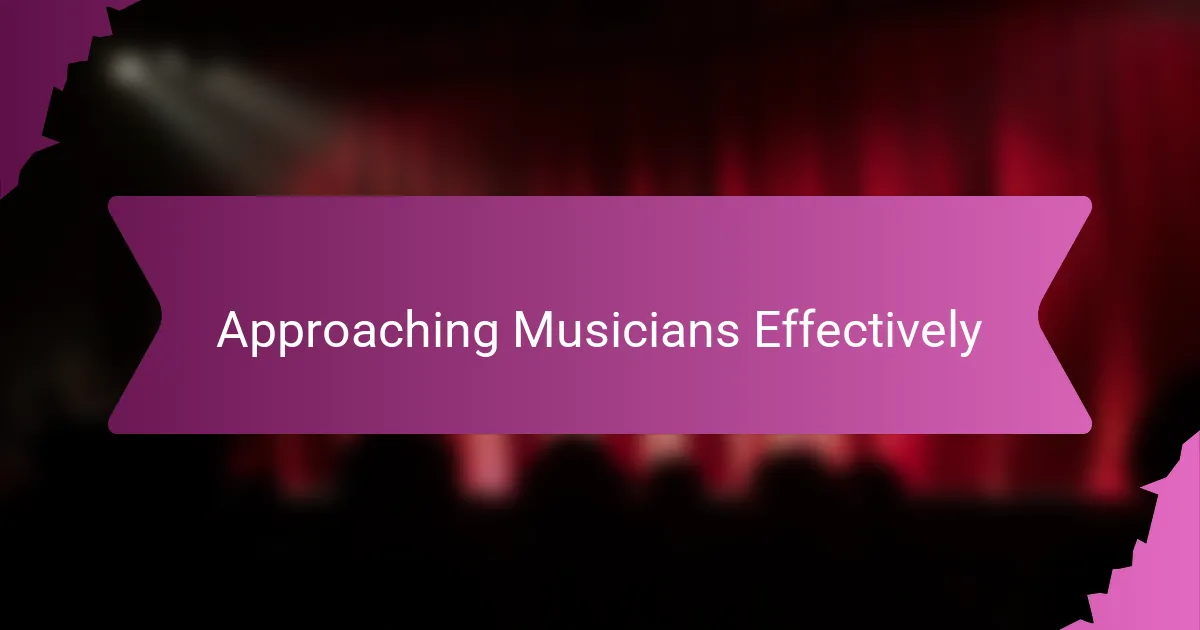
Approaching Musicians Effectively
Approaching musicians effectively means respecting their craft and time. I’ve learned that showing genuine interest in their music—rather than just what you want from them—opens doors far more smoothly. Have you ever tried striking up a conversation after a set, complimenting a specific song or lyric? It’s amazing how that small gesture can break the ice.
Timing also plays a huge role. I usually avoid catching musicians right before or during their performances because stress levels run high then. Instead, I find that chatting casually after the show or during soundcheck feels more natural, allowing for authentic exchange without the pressure. Have you noticed how much more relaxed and open artists seem when approached in those moments?
Finally, being clear and concise about your intentions shows respect and professionalism. When I reach out for collaborations or interviews, I briefly explain who I am and why I’m excited about their work. This approach makes the conversation feel sincere and purposeful, rather than intrusive. Don’t you think that honest transparency builds trust right from the start?
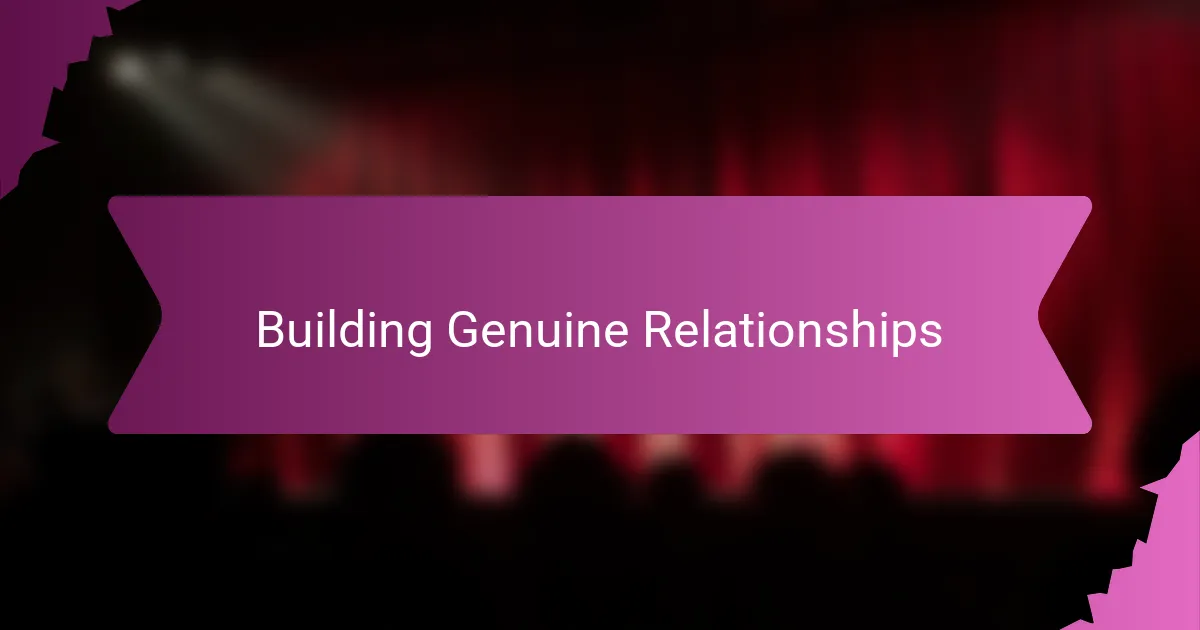
Building Genuine Relationships
Building genuine relationships is about moving beyond the surface and really seeing the person behind the music. I remember meeting a local singer-songwriter who initially seemed reserved, but as we talked more about our shared love for storytelling through songs, a real connection formed. Isn’t it fascinating how music can be the first step, but authentic friendship comes from understanding each other’s journeys?
I’ve noticed that showing consistent support goes a long way. Attending multiple gigs, sharing their music thoughtfully with friends, or simply checking in between shows creates a foundation of trust. Have you ever reached out just to ask how a project is coming along, without any agenda? Those moments feel less like networking and more like genuine companionship.
At the heart of these relationships lies patience. I’ve learned not to rush or expect immediate results but to appreciate the slow bloom of trust. When musicians feel seen as people first, collaborations become richer and more meaningful. Don’t you think that kind of authenticity is what transforms a casual acquaintance into a creative partnership?
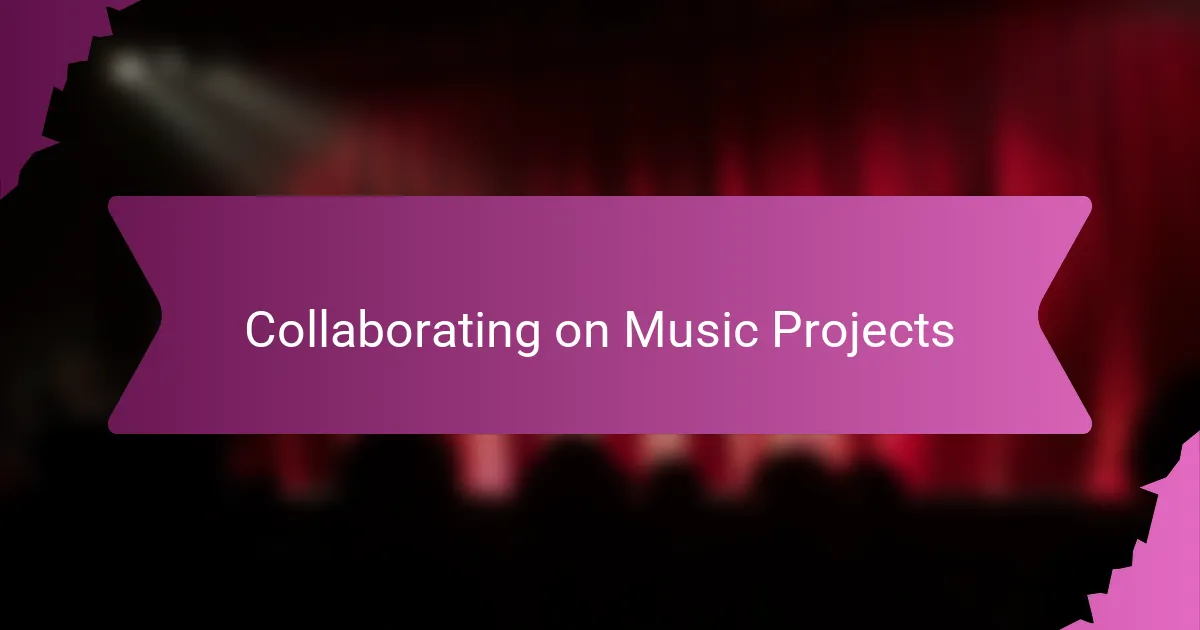
Collaborating on Music Projects
Collaborating on music projects often feels like a creative conversation without words. Once, I teamed up with a local drummer who brought rhythms I’d never heard before, and together we shaped a piece that neither of us would have created alone. Have you ever experienced that spark where two distinct styles just click and push your own boundaries further?
I’ve found that collaboration thrives on openness and mutual respect. When I approach a project, I try to listen as much as I contribute, allowing space for fresh ideas to emerge naturally. Isn’t it incredible how sometimes the best moments happen when you let go of control and follow the flow of shared creativity?
Scheduling and clear communication also matter more than I initially thought. Early on, I struggled with missed rehearsals and mixed expectations, but over time, setting simple agreements and deadlines made our collaborations smoother and more enjoyable. Have you noticed how a bit of structure frees up more time for genuine artistic exploration?
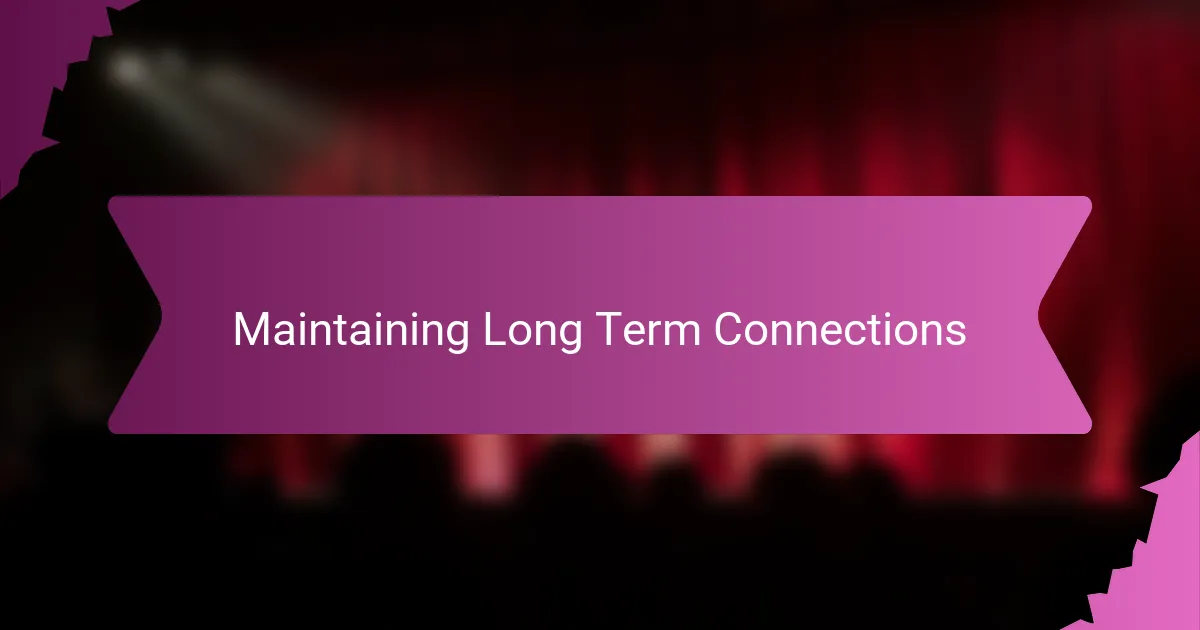
Maintaining Long Term Connections
Keeping long-term connections alive means more than just the initial enthusiasm; it’s about showing up consistently. I’ve found that regularly attending shows or dropping a quick message to check in can turn a casual acquaintance into a lasting bond. Doesn’t it feel good when someone remembers your name or asks about your latest project?
Sometimes, life gets busy, and relationships can unintentionally drift. When that happens, I try to revive the connection with a genuine update or a shared music recommendation. It’s amazing how a simple gesture like that can reopen doors and remind us why we connected in the first place. Have you ever experienced that reassuring “we’re still in tune” moment after a period of silence?
Over time, I’ve also realized that celebrating others’ milestones—whether it’s a new album, a gig, or even personal achievements—builds a positive cycle of support. I remember congratulating a local bassist on their first big show, and that small recognition sparked ongoing collaboration and friendship. Isn’t it rewarding when mutual encouragement turns into shared success?
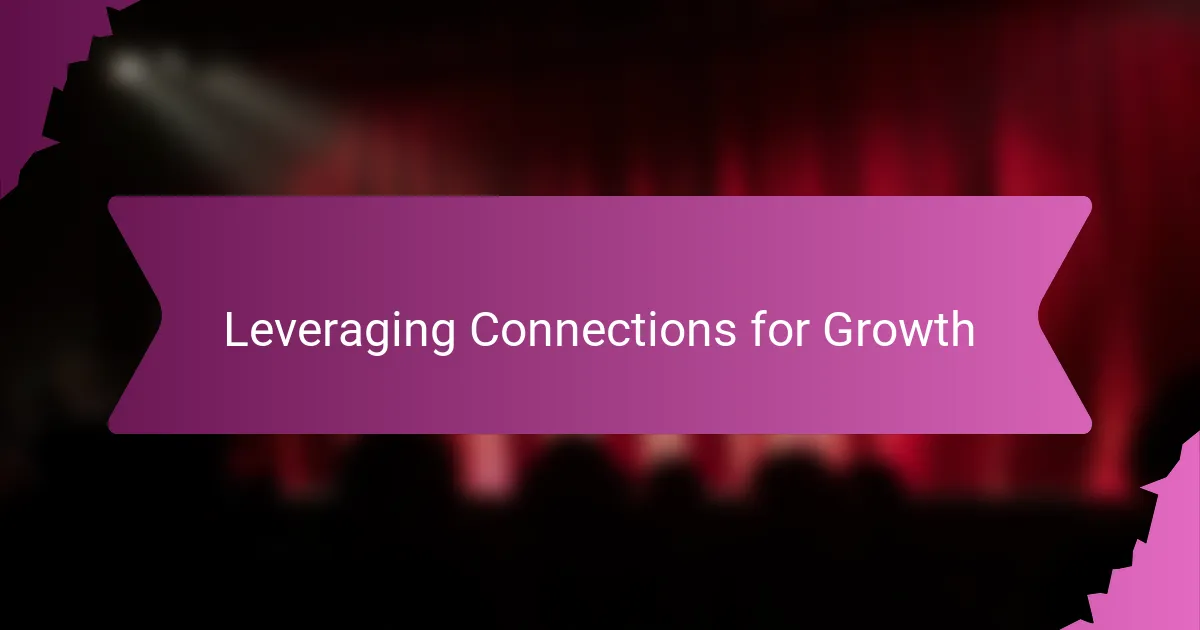
Leveraging Connections for Growth
Leveraging connections for growth means seeing every relationship as a chance to learn and evolve. I recall how a casual jam session with a local guitarist introduced me to a network of artists I hadn’t met before, each bringing new styles and ideas that expanded my own creative horizons. Don’t you find that when you open yourself to collaboration, growth becomes a natural outcome rather than a forced goal?
Another thing I’ve noticed is how these connections often lead to unexpected opportunities. Once, a musician I’d met at a small show invited me to join a community project that significantly boosted my visibility and skills. It made me realize that nurturing relationships isn’t just about immediate gains—it’s about planting seeds that flourish over time. Have you ever experienced a chance encounter that reshaped your musical path?
Finally, growth through connections depends heavily on mutual support. I make it a point to celebrate others’ successes and share resources when I can, knowing that what I give usually comes back in creative ways. This cycle of encouragement drives not only individual progress but also strengthens the entire local scene. Isn’t that the kind of growth worth striving for?